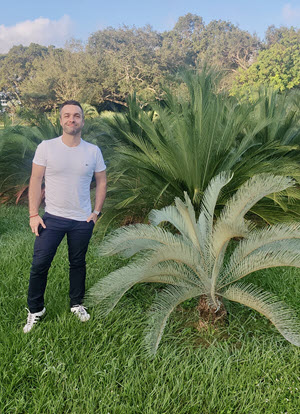 Dr James Clugston is a passionate conservation biologist with broad research interest in understanding molecular, morphological diversity and evolution of gymnosperms and angiosperms, with a focus towards species conservation of cycads (Cycadales).
Dr James Clugston is a passionate conservation biologist with broad research interest in understanding molecular, morphological diversity and evolution of gymnosperms and angiosperms, with a focus towards species conservation of cycads (Cycadales).
The focus of his research is on using and developing new molecular DNA sequencing techniques to address questions relating to genetic diversity and species conservation of cycads (Cycadaceae and Zamiaceae) worldwide. In his work he uses a broad range of molecular techniques and approaches in conservation genomics, systematics, phylogenetics, and plant evolution to explain and unravel complex biological and ecological questions. His research addresses critical questions ranging from the genetic diversity and history of species to resolving genetic issues for conservation to help document and understand fundamental diversity in species.
Outside of his research, James is the co-chair for the Global Conservation Consortium for Cycads, Australia and he is an active member of the IUCN SSC Cycad Specialist Group. James is also a keen science communicator and enjoy helping others to understand and better appreciate the natural world and the importance of species conservation.
As a Research Fellow at the Hawkesbury Institute for the Environment, James' research aims to design a new universal DNA marker set for all extant cycad lineages (both Cycadaceae and Zamiaceae). This marker set will be used to address conservation related questions, with an aim to characterise interspecific and intraspecific variation within and among populations to better understand species boundaries, detect hybridisation and create forensic applications for tackling illegal trade of cycads.
Areas of research/teaching expertise
Plant systematics, genomics, conservation genetics, taxonomy, phylogenomics, bioinformatics, morphology, plant identification, conservation biology, science communication, conservation horticulture, scientific photography and videography.
Grants
Montgomery Botanical Research Fellowship: A New Era for Cycad Genomics – Custom Cross-Species Marker Set).
Selected publications
Barrett RL, Clugston JAR, Orthia LA, Cook LG, Crisp MD, Lepschi BJ, Macfarlane TD, Weston PH, Wilkins CF, (2024) 'East rarely meets West: a revised delimitation for Pultenaea (Fabaceae: Mirbelieae) with reinstatement of Euchilus and three new genera from south-west Western Australia', Australian Systematic Botany, vol.37, no.5, SI, art no.SB23029Clugston JAR, Coolen Q, Houtepen E, van Proosdij ASJ, Grinage AD, Griffith MP, (2024) 'Genomic patterns of native palms from the Leeward Antilles confirm single-island endemism and guide conservation priorities', Conservation Genetics, vol.25, pp 985-997
Clugston, J. A.R., & Kenicer, G. J. (2022). Sexing cycads—a potential saviour. Nature Plants, 8(4), 326–327.
Clugston, J. A. R., R. R. Milne, G. J. Kenicer, I. Overcast, N. S. Nagalingum (2019). RADseq as a valuable tool for plants with large genomes—a case study in cycads. Molecular Ecology Resources, 19, 1610–1622.
Clugston, J. A. R., M. P. Griffith, M. A. Calonje, C. E. Husby, G. J. Kenicer, D. P. Little, and D. Wm. Stevenson (2018). Reproductive Phenology of Zamia L. – a comparison between wild cycads and their cultivated counter- parts. Botanical Review, Proceedings of the 9th International Conference on Cycad Biology, Memoirs of The New York Botanical Garden, 117, 433–462.
Clugston, J. A. R., Ruhsam, M., Kenicer, G. J., Henwood, M., Milne, R., & Nagalingum, N. S. (2022). Conservation genomics of an Australian cycad Cycas calcicola, and the absence of key genotypes in Botanic Gardens. Conservation Genetics, Page 123, 449–465
Clugston, J. A. R., C. E. Jeffree, A. Ahrends and R. R. Mill (2017). Do Environmental Factors Affect the Taxonomic Reliability of Leaf Cuticular Micromorphological Characters? A Case Study in Podocarpaceae. Edinburgh Journal of Botany, 74(3), 299–343
Clugston, J. A. R., M. P. Griffith, G. J. Kenicer, C. E. Husby, M. A. Calonje, D. Wm. Stevenson & D. P. Little (2016). Zamia (Zamiaceae) phenology in a phylogenetic context: does in situ reproductive timing correlate with ancestry? Edinburgh Journal of Botany, 73, 345–370.
 Dr James Clugston is a passionate conservation biologist with broad research interest in understanding molecular, morphological diversity and evolution of gymnosperms and angiosperms, with a focus towards species conservation of cycads (Cycadales).
Dr James Clugston is a passionate conservation biologist with broad research interest in understanding molecular, morphological diversity and evolution of gymnosperms and angiosperms, with a focus towards species conservation of cycads (Cycadales).